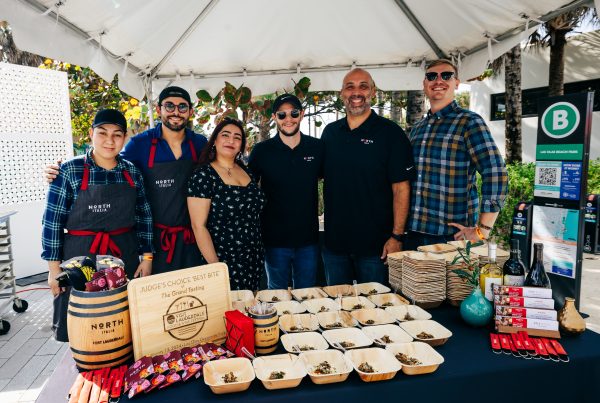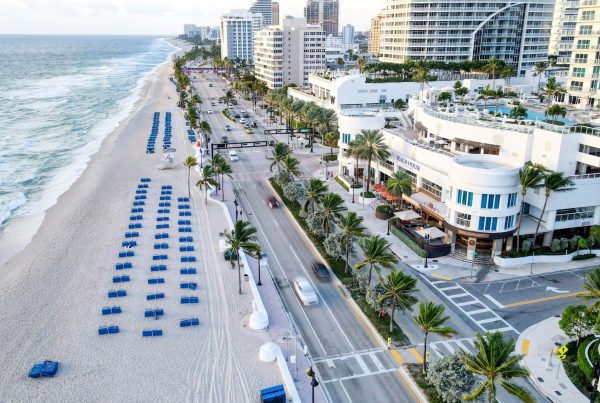Palm Beach County’s coastal farm belt won a victory last week that may be as symbolic as it is substantial.
At the end of a workshop meeting Tuesday afternoon, not one county commissioner wanted to consider a proposal that could have meant the end of the Agricultural Reserve Area. This was the first big vote on the reserve with three new commissioners in place since November.
The owner of land next to Delray Marketplace, at West Atlantic Avenue and Lyons Road, sought staff review for a residential project with almost 900 units. The development —called Brookside—would have been on land that taxpayers purchased two decades ago to guard against suburban-type development taking over the roughly 22,000-acre reserve between Boca Raton and Boynton Beach west of State Road 7.
That morning, a series of speakers had implored the commission not to further weaken protections against overdevelopment. Showing even a hint of interest in Brookside would have been a terrible omen.
After buying the land, the county resold it in 2006 with a conservation easement that does not allow any development. The owner—a longtime farmer—understood that restriction.
Last week, however, an attorney was telling commissioners that farming no longer works on that site. The attorney proposed all sorts of sweeteners, including environmental projects, if the county would allow development with what he called “essential housing” for Delray Marketplace employees.
Opening one piece of preservation land to development, though, could open all of it. Such an action would undercut the vote in 1999 to authorize the bonds that made the preservation program possible.
As the next item will make clear, this was far from the final battle over the reserve. Nevertheless, it’s a major victory.
Reminder of Ag Reserve history
For two hours before that vote, the new commission got a primer on the Agricultural Reserve Area—and, one hopes, a sense of how much the public wants to save it.
County staff members presented a history of the reserve, starting from that 1999 vote and the plan that followed. Commissioners heard that the county anticipated the need for some commercial development that would serve residents of the reserve. Planners chose two spots: West Atlantic and Lyons and West Atlantic and Boynton Beach Boulevard.
Elsewhere, there would be limits on commercial development. Residential developers would have to preserve part of their land. Farming and related uses, such as nurseries and horse farms, would be the priority.
But since land is development’s essential ingredient, pressure for looser restrictions began immediately. That pressure has continued. Last week’s orientation on the reserve was the first for new commissioners Michael Barnett, Sara Baxter and Marci Woodward. What would they hear?
They heard the same overwhelming support for the intent of that 1999 plan. Of the roughly 30 speakers, only two or three called for changes to allow more suburbia. One man said he had been unaware that his home is in a protected area. He wanted more schools and more stores. A real estate broker wanted “flexibility for quality projects.”
Everyone else, however, opposed development above what the original plan envisioned. A representative of Audubon Florida said 14 species of birds had been observed feeding in Agricultural Reserve fields. Two former county commissioners, Karen Marcus and Carol Roberts, noted that they had been present at the creation of the plan and urged the current commission not to deviate from it.
Marcus is co-founder and president of Sustainable Palm Beach County. She believes that there are “opportunities for more farming.” Marcus said the commission should not approve more unrelated “uses,” such as senior living facilities and traffic-generating warehouses.
When we spoke Wednesday, Marcus called the decision on Brookside “a tremendous victory” that might not have happened under the previous commission. She hopes to persuade the current board that saving the Agricultural Reserve Area makes sense economically, not just environmentally.
The next big vote is on GL Homes’ proposal to trade land outside the reserve for permission to build homes inside the reserve that current rules don’t allow. I’ll have more when that proposal gets to the commission.
More Boca lawsuit news
Boca Raton is not on a good streak with the courts.
I wrote about the ruling against the city from a federal judge in the case of an oceanfront lot whose owner wants to build a large home. The judge found that both elected officials and staff had acted wrongly when Boca Raton denied a permit necessary to allow construction.
Last year, the owner of a roughly three-acre site near Addison Mizner School sued after the city killed the application for an adult living facility (ALF) on the land. The sale contract depended on approval of the ALF. The city claimed that the project required a change to the comprehensive plan. The landowner and developer disagreed.
The case is significant. Councilwoman Monica Mayotte sponsored a text amendment to begin staff review of the ALF. Soon, however, the staff realized that to allow one there would require opening up several other neighborhoods to such facilities. Neighbors in Boca Square strongly opposed the ALF near Addison Mizner.
Last month, Palm Beach County Circuit Court Judge Samantha Schosberg Feuer denied the city’s motion to dismiss the lawsuit. On March 20, the city asked Feuer to quickly schedule a non-jury trial.
The owner’s attorneys objected, pointing out that Boca Raton had missed deadlines for court filings but now wanted a speedy schedule. Depositions and discovery were not complete, so the early date would have disadvantaged the plaintiff.
Last week, the city withdrew that request. The case will move ahead, with a lot at stake for Boca Raton.
Delray’s Long to pursue lawsuit
Speaking of lawsuits, new Delray Beach City Commission Rob Long told me that, despite his victory, he intends to pursue his lawsuit against a political ally of Mayor Shelly Petrolia.
Long sued Chris Davey, the chairman of the planning and zoning board, over what Long alleged were Davey’s “false and defamatory” social media posts before the March 14 election. Among other things Davey alleged that Long had committed “mortgage fraud.”
Davey has since filed his own motion seeking to dismiss the case. One argument Davey makes is that because Long is a public figure, the defamation standard is higher. I’ll have an update as developments warrant.
Boca resolves ADA-related lawsuit
Speaking again of lawsuits, Boca Raton finally resolved one that had prevented the posting of meeting documents.
A South Florida man filed a federal lawsuit against several local governments, claiming that allowing people to download those documents directly from meeting agendas violated the Americans With Disabilities Act. As a result, residents or anyone else interested in certain items—such as development projects—had to make a public request for the material.
Eventually, however, the defendants prevailed at the 11th U.S. Circuit Court of Appeals. According to a city spokeswoman, a panel of judges found that websites are not a “place of public accommodation” as defined in Title III of the law. The 12 listed locations “are all tangible, physical places.” Documents for city council meetings again are available when agendas are posted.
As the lawsuit progressed, the spokeswoman said, “staff participated in a decent amount of training on how to make documents ADA-accessible.” Though this was a nuisance lawsuit, the outcome has created better access for everyone.
Then and now
I wrote last week about the swearing-in ceremonies for new elected officials in Boca Raton and Delray Beach. What a change it was from three years ago.
In late March 2020, COVID-19 pandemic restrictions had just taken effect. Boca Raton Mayor Scott Singer, who just started his second term, recalled beginning his first with a swearing-in over Zoom.
This year in Delray Beach, City Commissioner Adam Frankel sat on the dais as new colleagues Angela Burns and Rob Long took office. In 2020, Frankel attended the organizational meeting, but he sat in the audience to maintain social distancing. How much, in all ways, has changed.







